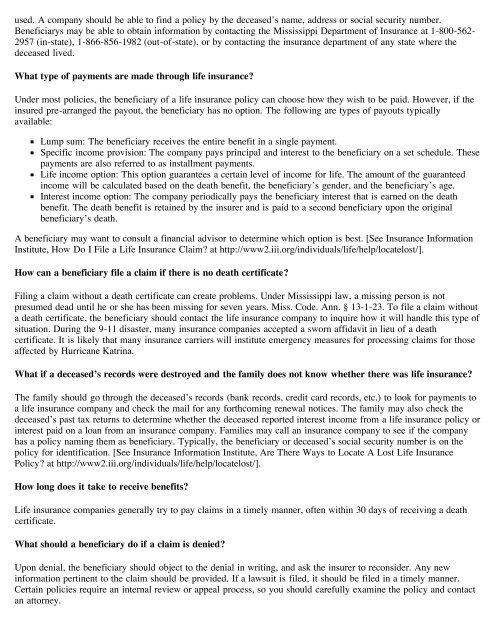Hurricane Katrina: Legal Issues - Columbus School of Law
Hurricane Katrina: Legal Issues - Columbus School of Law
Hurricane Katrina: Legal Issues - Columbus School of Law
You also want an ePaper? Increase the reach of your titles
YUMPU automatically turns print PDFs into web optimized ePapers that Google loves.
used. A company should be able to find a policy by the deceased’s name, address or social security number.<br />
Beneficiarys may be able to obtain information by contacting the Mississippi Department <strong>of</strong> Insurance at 1-800-562-<br />
2957 (in-state), 1-866-856-1982 (out-<strong>of</strong>-state), or by contacting the insurance department <strong>of</strong> any state where the<br />
deceased lived.<br />
What type <strong>of</strong> payments are made through life insurance?<br />
Under most policies, the beneficiary <strong>of</strong> a life insurance policy can choose how they wish to be paid. However, if the<br />
insured pre-arranged the payout, the beneficiary has no option. The following are types <strong>of</strong> payouts typically<br />
available:<br />
Lump sum: The beneficiary receives the entire benefit in a single payment.<br />
Specific income provision: The company pays principal and interest to the beneficiary on a set schedule. These<br />
payments are also referred to as installment payments.<br />
Life income option: This option guarantees a certain level <strong>of</strong> income for life. The amount <strong>of</strong> the guaranteed<br />
income will be calculated based on the death benefit, the beneficiary’s gender, and the beneficiary’s age.<br />
Interest income option: The company periodically pays the beneficiary interest that is earned on the death<br />
benefit. The death benefit is retained by the insurer and is paid to a second beneficiary upon the original<br />
beneficiary’s death.<br />
A beneficiary may want to consult a financial advisor to determine which option is best. [See Insurance Information<br />
Institute, How Do I File a Life Insurance Claim? at http://www2.iii.org/individuals/life/help/locatelost/].<br />
How can a beneficiary file a claim if there is no death certificate?<br />
Filing a claim without a death certificate can create problems. Under Mississippi law, a missing person is not<br />
presumed dead until he or she has been missing for seven years. Miss. Code. Ann. § 13-1-23. To file a claim without<br />
a death certificate, the beneficiary should contact the life insurance company to inquire how it will handle this type <strong>of</strong><br />
situation. During the 9-11 disaster, many insurance companies accepted a sworn affidavit in lieu <strong>of</strong> a death<br />
certificate. It is likely that many insurance carriers will institute emergency measures for processing claims for those<br />
affected by <strong>Hurricane</strong> <strong>Katrina</strong>.<br />
What if a deceased’s records were destroyed and the family does not know whether there was life insurance?<br />
The family should go through the deceased’s records (bank records, credit card records, etc.) to look for payments to<br />
a life insurance company and check the mail for any forthcoming renewal notices. The family may also check the<br />
deceased’s past tax returns to determine whether the deceased reported interest income from a life insurance policy or<br />
interest paid on a loan from an insurance company. Families may call an insurance company to see if the company<br />
has a policy naming them as beneficiary. Typically, the beneficiary or deceased’s social security number is on the<br />
policy for identification. [See Insurance Information Institute, Are There Ways to Locate A Lost Life Insurance<br />
Policy? at http://www2.iii.org/individuals/life/help/locatelost/].<br />
How long does it take to receive benefits?<br />
Life insurance companies generally try to pay claims in a timely manner, <strong>of</strong>ten within 30 days <strong>of</strong> receiving a death<br />
certificate.<br />
What should a beneficiary do if a claim is denied?<br />
Upon denial, the beneficiary should object to the denial in writing, and ask the insurer to reconsider. Any new<br />
information pertinent to the claim should be provided. If a lawsuit is filed, it should be filed in a timely manner.<br />
Certain policies require an internal review or appeal process, so you should carefully examine the policy and contact<br />
an attorney.

















